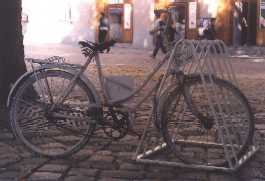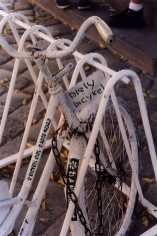
|
home |
|
Don't Throw It in the Danube Bratislava Fails White Bike Test The first attempt to introduce an alternative public transport scheme to the Slovak capital city Bratislava (population 450,000) was declared a failure one week after its launch. The Biely Bicykel (White Bike) project was to provide eight bicycles that any member of the public could ride for free, with the last user leaving the vehicle at one of nine designated bike racks in the Old Town. But during the project's first week all the bikes either disappeared or were destroyed.
With the project head conceding failure, Bratislava Old Town spokesman Milan Vajda said: "This is a lesson about the minds of the people in this city. This is an example of Bratislavans' attitudes. It seems like we are not ready for this kind of activity." The city had supported the White Bike project by installing 13 bike racks around the city center at the cost of 200,000 Slovak crowns ($4,250). The Old Town also pledged to install 64 more bike racks over the following year, and promised to create bike paths on city roads. "We thought these deeds would help the White Bike project, but it seems that they did not," Vajda said. The Bratislava Old Town received its first White Bike on July 18, 2001 from the Dutch Embassy. Henk Soeters, Dutch Ambassador to Slovakia, said that his native country had begun a similar free-bike system in large cities in the 1960's as a way of dealing with oil shortages, pollution, and increasing traffic. "We have had success with similar bicycle systems in our country, and the White Bike can provide a clean alternative to cars in Bratislava as well," he said in July. "But it's a difficult project. It will only be successful if those who use the bikes respect the rules of the game. When you play hockey but use soccer rules, for example, it will certainly end in disaster." To help riders follow the rules, the original White Bike had a list of guidelines painted on it, such as where the bike could be ridden and left. Yet this safeguard evidently failed—the bike went missing one day after its release. One rule which was not included, but should have been, said Ambassador Soeters: "Don't throw it in the Danube." Old Town Spokesman Vajda, who says he is an "optimist, but a realist," said that the pilot bike was a "public test of our morality." "We'll see if we can have public bicycles without them being stolen. In Bratislava, and in Slovakia in general, if something is not locked up there is a high probability of it being stolen," he said. Despite the failure of the project, both Vajda and Koziel said they would not give up hope that someday an alternative public transport scheme would exist in the capital. However, security measures will likely be introduced to discourage theft and vandalism.
"Maybe next spring I will start a program where the bikes would still be free but users would have to register to use them and leave their passport or ID card," said Koziel, who is a 27-year-old African Studies university student in Bratislava. "We have to protect the bikes somehow or the same thing will happen." Standing on Frantisanske square just meters from Main Square, Koziel motioned to the last White Bike. It had been chained to a stand when the other bikes went missing. Koziel said that the last White Bike would remain on the square and perhaps be turned into a statue to remind citizens of the failed project. "I am disappointed, but I was not so naive when I began this project to think that this would not happen," he said. "I still figured I should try. And in the end we can call Biely Bicykel a small success in that people now know about the project." Vajda added: "This is not the time for disappointment, we have learned a lesson. You have to try. "Anyway this was not a real attempt to make a change. It was a small campaign to raise awareness of the issue, but we knew eight bikes would not solve everything."
Chris Togneri was born and raised in Oakland, California, went to college in Nebraska, and from there made his way to Bratislava, Slovakia, to coach baseball. A switch to journalism led him to The Slovak Spectator, an English-language weekly, where he has served as staff writer, news and culture editor, and travel editor. He currently files reports for the Spectator as the Eastern Slovakia correspondent.
| |||||||||||||||||||||||



